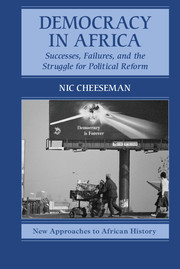Book contents
- Frontmatter
- Dedication
- Epigraph
- Contents
- LIST OF FIGURES
- LIST OF TABLES
- LIST OF ACRONYMS
- ACKNOWLEDGEMENTS
- Introduction: Democratization Against the Odds
- 1 Fragments of Democracy: Participation and Control in Authoritarian Africa
- 2 Cultures of Resistance: Civil Society and the Limits of Power
- 3 The Second Liberation: Economic Decline, the End of the Cold War, and the Struggle for Democracy
- 4 Exporting Elections: International Donors and the Era of Democratic Dependency
- 5 Subverting Democracy: The Advantages of Incumbency and the Politics of Violence
- 6 The Democratic Dividend: Political Competition, Populism, and Public Policy
- Conclusion: Designing Democracy to Manage Diversity and Distrust
- APPENDIX 1 The Fate of Africa's Democratic Experiments 1989–2014
- APPENDIX 1 THE FATE OF AFRICA'S DEMOCRATIC EXPERIMENTS 1989–2014
- INDEX
- References
2 - Cultures of Resistance: Civil Society and the Limits of Power
Published online by Cambridge University Press: 05 May 2015
- Frontmatter
- Dedication
- Epigraph
- Contents
- LIST OF FIGURES
- LIST OF TABLES
- LIST OF ACRONYMS
- ACKNOWLEDGEMENTS
- Introduction: Democratization Against the Odds
- 1 Fragments of Democracy: Participation and Control in Authoritarian Africa
- 2 Cultures of Resistance: Civil Society and the Limits of Power
- 3 The Second Liberation: Economic Decline, the End of the Cold War, and the Struggle for Democracy
- 4 Exporting Elections: International Donors and the Era of Democratic Dependency
- 5 Subverting Democracy: The Advantages of Incumbency and the Politics of Violence
- 6 The Democratic Dividend: Political Competition, Populism, and Public Policy
- Conclusion: Designing Democracy to Manage Diversity and Distrust
- APPENDIX 1 The Fate of Africa's Democratic Experiments 1989–2014
- APPENDIX 1 THE FATE OF AFRICA'S DEMOCRATIC EXPERIMENTS 1989–2014
- INDEX
- References
Summary
The downgrading of democratic institutions and the emergence of one-party, military, and dictatorial rule strengthened the position of African leaders in the 1970s. But most African governments lacked the coercive capacity to govern through repression alone. Rulers therefore faced strong incentives to build and maintain a support base. Of course, nationalist heroes could fall back on the glory of the anti-colonial struggle and their role as founding fathers to generate – personal loyalty, but on its own this was rarely enough. Consider the fall from grace of Kwame Nkrumah, perhaps Africa's most iconic nationalist leader. Having first come to prominence as the general secretary of the United Gold Coast Convention (UGCC), he soon became impatient with the UGCC's moderate stance and the slow pace of change.
A period of imprisonment in 1948 at the hands of the colonial government intensified Nkrumah's conviction that the Gold Coast (now Ghana) needed “self government now” and he subsequently left the UGCC to lead the more radical Convention People's Party (CPP). Thereafter he became one of the most passionate critics of colonial rule, and one of the most eloquent advocates of African unity. Indeed, Nkrumah's invocation to “Seek ye first the political Kingdom and all else will be added to you” became the defining statement of the nationalist belief that once the colonial state had been transferred to African hands, all else would follow. It certainly resonated in the Gold Coast, where the CPP rapidly emerged as the dominant political party, enabling Nkrumah to secure the position of prime minister in 1952.
But Nkrumah's confidence that his control of the state would enable him to effect far-reaching social, political, and economic transformation was also his undoing. Having declared Ghanaian independence in 1957, the CPP overreached itself. Government control over economic activity was tightened in order to channel resources towards industrialization, which Nkrumah believed was necessary for Ghana to establish economic autonomy – and hence “true” independence – from Western powers.
- Type
- Chapter
- Information
- Democracy in AfricaSuccesses, Failures, and the Struggle for Political Reform, pp. 57 - 85Publisher: Cambridge University PressPrint publication year: 2015

